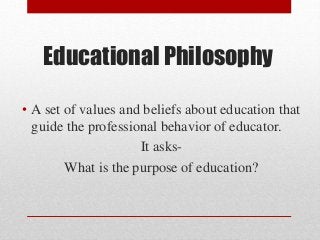The philosophy of education is the study of educational theories, concepts, and practices. Its primary purpose is to explain the purpose and process of education and what it involves. Its branches include descriptive, imaginative, and normative theories. These differ in their focus on the purpose of education. For example, one branch focuses on the purpose of education, while the other focuses on the process of education.
Normative philosophies
Normative philosophies in education draw upon empirical research or factual inquiries about human beings and the psychology of learning to make claims about what education should be and what it should cultivate. Whether it is a public school, a private school, or any educational endeavor, normative philosophy is implied in every endeavor. Similarly, social philosophy and ethics have some bearing on how education should be conducted.
Despite its many potential benefits, normative analysis is susceptible to two common pitfalls. First, it can be overly generalized, eroding the power of critique. Second, overly specific norms are viewed as inappropriate by other educators and scholars. Consequently, it is important to choose a normative framework with care.
Normative philosophies in education have been shaped by important intellectual and social trends over the past century. They include Marxism, existentialism, psychoanalysis, and phenomenology. In their work, they emphasize the aims of education and the morality of different means to achieve these aims. Recent debates have focused on issues of authority and control.
A normative philosophy in education can be developed by philosophers, who can then use it to reform the educational system. They can also begin an experimental school in order to put their philosophy into practice. They may even try to convince the society as a whole to adopt the philosophy. The basic idea behind such an approach is that they appeal to a shared impulse, which is difficult to argue directly.
The main goal of a philosophy of education is to promote a culture of learning. It is important to ensure that all people have access to quality education. The goal is to create the best possible society for every child. There is no single correct way to do this, but a fundamental philosophy can influence the quality of education.
While there is no single ideal or theory for education, the most fundamental question in deciding whether an educational system is best is whether or not a particular policy will foster growth. It is important to be aware of the purpose of a philosophy in education and how it can affect the society.
Normative theories
Normative theories in philosophy of education seek to provide standards, norms, and goals for educational practice. Some of the most common educational philosophies include educational perennialism, educational progressivism, essentialism, critical pedagogy, and democratic education. While no single philosophic perspective is necessarily best, there are many similarities among the major philosophies.
The biggest normative theories came into prominence in the late 1970s and early 1990s. This shift was likely triggered by John Rawls, whose influential book A Theory of Justice (1976) caused a dramatic shift in normative legal argument. Rawls’ big normative theory involved the concept of justice as fairness, as well as the principles of liberty and difference. He also introduced concepts such as the veil of ignorance and reflective equilibrium to normative legal theory.
Normative theories are the underlying assumptions that guide human behavior and judgment. These models exclude people with marginalized experiences from participating in the philosophical dialogue and are therefore unable to contribute to the governing assumptions about human beings and their behavior. They are also unable to define the truth in terms of socially normative ways.
Another type of normative theory is the teaching theory. This theory emphasizes the role of teaching as an overall phenomenon that is characterized by a number of variables. Teaching activities include curriculum, teaching learning situations, and teaching aids. The teaching activities are intended to influence a change in the behaviour of students.
Normative theories in philosophy of education are an excellent foundation for education policy and practice. But they should be used carefully, as they differ from one another. For example, a legal norm can be just and morally bad, but illegitimate. And, of course, a morally correct but illegitimate norm can also be legitimate. In such a case, the value of the process is different from the value of the outcome.
Descriptive theories
There are a number of different descriptive theories in philosophy of education. Some focus on particular aspects of education, such as the aims of education. These studies, known as conceptual analysis, seek to clarify what is meant by “education”. Others focus on specific aims, such as passing on knowledge or developing good judging, reasoning, and acting skills. These theories are usually controversial.
Rousseau’s book Emile is an example of a descriptive theory in philosophy of education. Rousseau believed that all children are created equal and that a corrupt society prevents them from developing into virtuous adults. To prevent this, Rousseau advocated removing children from society and conditioning them through puzzles and other environmental changes.
A descriptive theory in philosophy of education describes and explains the processes that make up education. It is similar to a conceptual scheme used in science. The difference is that a descriptive theory is value neutral and explains the fundamentals of education. Descriptive theories are different than normative theories, which investigate whether or not a particular educational process is good for a particular group of people.
Descriptive theories in philosophy of education are a type of philosophical concept that defines what education is and how it can help people achieve it. Various philosophers and educators have made contributions to education through the study of the nature of human behavior and learning. Their works and theories may be useful or useless in real life situations, but they all seek to educate human potential.
In addition to using descriptive theories, philosophers of education have adopted the idea that education should create equal opportunities for people of all backgrounds. However, active discrimination and unequal distribution of wealth threaten this goal. For this reason, some philosophers of education are promoting the use of qualitative and quantitative methods in educational research.
Imaginative theories
Imaginative theories in philosophy of education focus on a variety of processes of inquiry, knowledge, and understanding. They advocate openness to all forms of education and diversity in thought. These theories encourage experimentation and the use of diverse languages and practices. Some emphasize social justice while others advocate a more scientific approach.
The series covers a wide range of topics, from fundamental concepts to more specific theories. While some studies focus on defining concepts, others explore the goals of education, including the transfer of knowledge and the development of good judging, reasoning, and acting. The more detailed aims of education tend to be controversial, however.
Teachers often have three objectives: to inspire students’ curiosity, to instill knowledge, and to develop student motivation. They also strive to improve academic achievement and test scores. In an age of standardized tests and other assessments, teachers must work with the emotions and imagination of students in order to maximize their learning potential. The IE approach can be an effective way to meet these goals.
Imagination has many facets. Many philosophical theories have explored the role of imagination in engagement with the arts. Some of the most prominent theories focus on how the use of the imagination can affect the way we learn and understand the world. Many of these theories offer insight into how teachers can foster students’ imaginative skills, while others are purely conceptual.
Imaginative theories in philosophy of education focus on the role of imagination in learning. In addition to providing a value-neutral explanation of what education is, these theories emphasize moral responsibility, integration, and the ability of children to fulfill their destiny. These theories also offer a wide range of options for curriculum development and teaching.
The interest in imagination comes from engagement with literature, art, and music. Some philosophers have invoked imagination to capture the essence of fiction and explain the expressive qualities of musical works. Others have argued that imagination is central to questions concerning art and its ontological nature.

